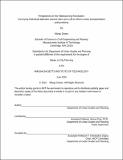Perspectives on the Ridesourcing Revolution : surveying individual attitudes toward Uber and Lyft to inform urban transportation policymaking
Author(s)
Dawes, Margo
DownloadFull printable version (1.395Mb)
Alternative title
Surveying individual attitudes toward Uber and Lyft to inform urban transportation policymaking
Other Contributors
Massachusetts Institute of Technology. Department of Urban Studies and Planning.
Advisor
Jinhua Zhao.
Terms of use
Metadata
Show full item recordAbstract
Media coverage of ridesourcing services such as Uber and Lyft has described a rivalry between new technology and the established taxi industry. Individual users and non-users of ridesourcing, however, may have more nuanced perspectives, but policymakers have little guidance on how to best represent these interests. This thesis uses a standardized questionnaire distributed across the United States by an online survey company to understand individual attitudes toward Uber, Lyft, and ridesourcing technology as a whole. It asks respondents if they identify as users or non-users of ridesourcing, why or why not, how they rank Uber and Lyft among their other travel modes, their attitudes toward the companies and toward the technology in general (on a Likert scale of 1, very negative, to 5, very positive), and their opinions on how their cities should respond, among other questions. 394 completed questionnaires from the most populous 15 metropolitan statistical areas in the U.S. reveal individuals' use of and attitude toward ridesourcing technology along with variations across demographic groups, cities and regions, and primary travel mode. The survey returned a response rate of 27% and the spatial distribution of responses was roughly proportional to the population of each metropolitan area. The findings indicate that about 70% of respondents use some form of ridesourcing, mostly for special-purpose trips such as avoiding driving while intoxicated and getting to and from the airport. The vocal minority who don't use Uber or Lyft for ethical reasons represent only a small subset of the sample (about 6%), but 1 in 5 respondents said the companies' decision to treat drivers as independent contractors rather than employees made them want to use the services less. There are relationships between transportation characteristics (e.g. usage of Uber and Lyft, needing to travel for work, and having access to a car) and user identification and attitude, but demographics are the best predictor of user identification, which in turn predicts attitude, which predicts policy implications. The study suggests potential for policymakers to leverage constituent perspectives to change aspects of ridesourcing that have low public approval.
Description
Thesis: M.C.P., Massachusetts Institute of Technology, Department of Urban Studies and Planning, 2016. This electronic version was submitted by the student author. The certified thesis is available in the Institute Archives and Special Collections. Cataloged from student-submitted PDF version of thesis. Includes bibliographical references (pages 64-69).
Date issued
2016Department
Massachusetts Institute of Technology. Department of Urban Studies and PlanningPublisher
Massachusetts Institute of Technology
Keywords
Urban Studies and Planning.